“Jutlandic people, plait garlands of flowers for the Tenth Muse, worthy reward for service, dancing nymphs bear forth.”
Thus, in 1658, did the Dutch “tenth muse”, Anna Maria van Schurman, pay tribute to the Danish noblewoman, Birgitte Thott.
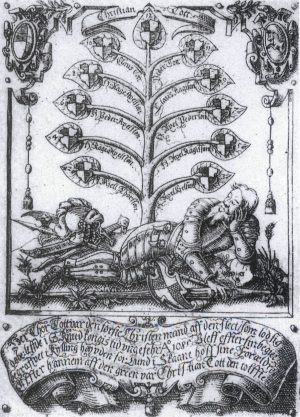
The praise was well-deserved. Birgitte Thott (1610-1662) was the foremost Danish learned woman of her day, a “femina docta”, a “femina illustris”. She is one of the few Danish women whose passing was marked with tribute poems in Latin, and probably the only one to have been honoured by poems in Greek too. That she was in part a guinea-pig for the ambitious young males at Sorø Academy, who would seem to have used the occasion as an opportunity for translation exercises, takes nothing away from her reputation. Panegyric composition can only be practiced on the outstanding. Birgitte Thott would have been delighted by the poems.
In her treatise Om et lyksaligt liv (On a Happy Life), she praises the Romans for having introduced a law stating that women should also be accorded funeral orations in which they are praised according to their deserts, just like men. A long, printed funeral address in Latin by professor at Sorø Academy Jørgen Rosenkrantz has been preserved. The text provides an impression of her childhood and background. Birgitte Thott lost her father, Christen Thott, when she was six years old; her mother, Sophie Below, then took over the role of child rearer, doing so in a responsible manner and awakening the girl’s interest in knowledge. We learn from Jørgen Rosenkrantz:
“As she grew older, she started to like, take an interest in and indeed study foreign literature and languages, particularly because both in keeping with her own emotional resolution and in accordance with her good father’s intent, she had given herself to the study of languages and the very best fields of learning. She learnt, namely, the languages German, French, English and Spanish, in which eminent and highly profitable theological writings are preserved, with no coaching or assistance, and she made such felicitous headway that she could, as a matter of course, participate flawlessly in dialogue with others and could translate anything without difficulty.”
Funeral oration is by nature a eulogistic genre with scope for exaggeration, but Birgitte Thott’s language skills have been corroborated by so many others that we may take Rosenkrantz at his word. Her translations speak for themselves in bearing out her talents, even though they might not cover all the languages she apparently actually spoke.
“From infancy there was such a radiant glow from her exceptionally good talent and her noble character that her parents were caused to wonder. Once they realised that their daughter was obviously in command of a larger degree of intellect, memory and, best of all, virtue than was thought could be allotted her sex and age, from her early years they immediately paid for her upbringing and saw to it that she was meticulously educated in the virtues worthy of a Christian maiden.”
(Jørgen Rosenkrantz, funeral oration for Birgitte Thott)
In 1632, at twenty-two years of age, Birgitte Thott married the nobleman Otto Giøe. It is likely that they had met in childhood, given that Otto Giøe had grown up living with Birgitte Thott’s uncle, Holger Rosenkrantz “the learned”, father of the aforementioned Jørgen Rosenkrantz at Sorø Academy. In this home at Rosenholm Castle in the Djursland area of Jutland, as we learn from Birgitte Thott herself, she was inspired by the literary milieu and its reflective discussions. She wrote a short description of the experience in Om et lyksaligt liv.
At Rosenholm Castle, Holger Rosenkrantz held what could be called scholarly seminars, possibly with discussion or lectures in Latin. It was here that Birgitte Thott’s husband, Otto Giøe, learnt Latin, for which he did not, however, have much use. In 1627, shortly after he had embarked on a military career, he suffered a gunshot wound which was seemingly the cause of his death at a relatively young age. He and Birgitte Thott were married for ten years.
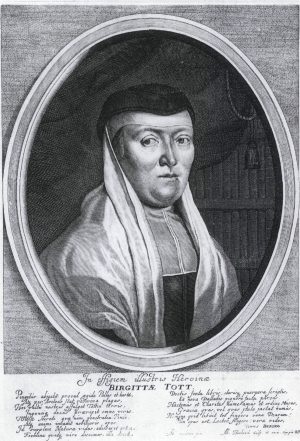
The marriage was childless, but Birgitte Thott’s life was not without children. It was common practice in the aristocratic families to take responsibility for the upbringing of one another’s children, and Birgitte Thott had charge of at least two foster daughters, Elisabeth and Sophie Thott. We do not know if she fostered other children, or for how long. Elisabeth was close to Birgitte, who taught her English, a language with which not many Danes were familiar at the time. During a lengthy vigil at the sick- and deathbed, Elisabeth would pass the time by translating, under her aunt Birgitte’s supervision, devotional works in English, which helped keep her spirits up. Sophie Thott is possibly the Sophie who copied out Birgitte’s major work, Om et lyksaligt liv.
In this work, Birgitte Thott reflects on the subject of child-rearing. In chapter 46 she objects to the general contention that women have neither the inclination nor the resolve to study. In her opinion, the reason that so few women have academic proficiency should be sought in their childhood: their teachers rarely encouraged girls to read, and indeed often even openly held them back from doing so. She quotes an anonymous old poet who stated that “no one wants to venture into the unknown”, and she shows how hours are spent explaining to boys why learning is so important, whereas no one says anything to the girls: “No one whets their appetite to the sweetness found there. No one tells them what delicious food there is for the soul, what effective remedy against all their frailties it is to have a little understanding of bad and good. There are many, and this I have heard often, who would rather impress upon young maidens that poring over books will make them objects of derision.”
The boys, on the other hand!
“But young male children are treated completely differently. They are enticed into study by the reward and honour they are told they can thereby attain; […] they are impelled to attend school by their parents or guardians whether they like it or not. There are so many learned men who sweat and toil to educate and teach them […] neither exertion nor expense is spared at the institutions of education […] in order to lead the students onwards.”
After this salvo the lady plays her trump card, for what is the result of all this effort: “and yet it does not amount to much for many who have neither ability nor resolve for the purpose.”
According to the funeral orations for Birgitte Thott and her husband, in her role as wife she had been a pleasant personality who fulfilled her wifely duties to perfection. The funeral oration for her husband does not mention her scholarship. It was apparently of greater prestige to have a good wife than a learned one, although she might not have been known publicly for learning at all at the time of his death, given that her major works are dated to her widowhood. Only one piece of work – an unpublished translation, from German, of Holger Rosenkrantz’ Fürstenspiegel – is dated to her period of married life, 1636.
As soon as she became a widow, she turned over a new leaf and started to learn Latin.
“So, at thirty-one years of age, guided by eminent teachers, she embarked upon learning the Latin language, which today is studied far and wide by scholars, and the result was so good that she could very soon express whatsoever thought she so wished in that language. In order to acquire the innermost meaning of the Holy Scripture she later worked – not without yield and exceptional progress – with the Hebrew language, which is the language employed by God to impart His Word to the patriarchs and the prophets, and in which the canonical writings of the Old Testament were originally rendered. She was perfectly aware that water has one taste at its source and another down the river.”
Jørgen Rosenkrantz, funeral oration for Birgitte Thott.
Seneca Translation
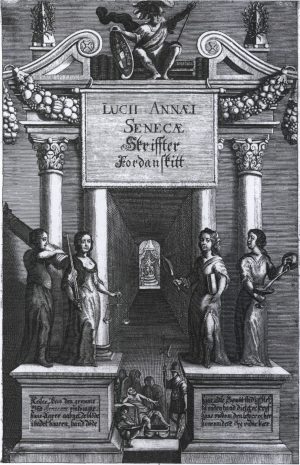
Birgitte Thott had barely learnt Latin when she fell hook, line and sinker for Seneca:
“[I] have to admit that, with the exception of the words of God, I have never read anything with such great pleasure and benefit as the works of Seneca.”
Given that she saw it as a great kindness to her fellow Danes, “who have learnt nothing other” than their national language, not simply to write books in that language but also to translate useful books that served to “promote […] virtue and good habits”, she then decided, since no one else would make the necessary “effort”, to “translate” Seneca’s writings “into our Danish tongue”.
In 1658 a splendid 1,000-page work was printed. The book was furnished with two excellent engravings – one a portrait of the translator – and opened with twelve laudatory poems written in several languages, as well as two introductions by Birgitte Thott. Of the twelve poems, eleven were written by men from Denmark. The twelfth, which was the first in the book, was in Latin, written by none other than the aforementioned Dutch prodigy, Anna Maria van Schurman, who did not know Birgitte Thott personally, it is true, but who was kept appropriately informed as to what was happening in the world of scholarship.
Anna Maria van Schurman’s poem at the beginning of Thott’s Seneca translation was written in Latin; translated into English it reads:
Seneca’s mighty shadow and ashes, so momentous a man’s,/ a woman of rank has now ventured to awaken from death./ She gave him back life under northern stars,/ now once more she calls forth speech from the mouth of the sage./ People of Spain, you must yield, the glory of Annaeus deserted you,/ the Danish people can rightly claim it as theirs./ People of Jutland, plait flowers in garlands for the Tenth Muse,/ worthy reward due borne forth by dancing nymphs./ Should she not be admitted to the Muses’ mountain peak?/ She grants him life again – this time life without death.
The translation of Seneca was a remarkable achievement, providing Denmark with its first translation of a classical work. Birgitte Thott was not fumbling in the dark when she chose Seneca. She was well aware that just about every other European country had translated works of Seneca into the national language, but she also knew that they had translated many other classical works. She liked this Stoic philosopher and thought – as did Erasmus of Rotterdam and the English bishop Joseph Hall, whom she quotes – that he frequently expressed ideas more Christian than those of the Christians. The Stoic ethic was all the rage among intellectuals in the mid-1600s, and it was no great distance from the philologists’ toil, determining the correct text and filling the lacunae in the manuscripts, to the toil of the Bible commentators. Birgitte refers to five earlier Seneca commentators, calling them “learned and perspicacious men”, but she seems to think that they have a tendency to inflate their efforts, which did not always bear comparison with their results: despite “such great diligence” and “following prolonged study”, they had “been able to satisfy neither themselves nor others, as is apparent from their long-winded and mutually-conflicting commentaries”.
“The Danish Seneca” is “affectionately dedicated to the commendable woman, all those of womankind who love virtue and reason”, and the translator wishes the women good fortune in absorbing this valuable material. Birgitte Thott gives two reasons for translating Seneca: a personal wish to learn about his teachings, and the hope of gratifying those who could not read Latin, which meant, among others, women.
In the preface, she gives an account of what Seneca stands for and how his texts should be read in the light of Christian teachings. Using biblical quotations and imagery, she explains the benefit and necessity of access to a Danish translation of Seneca’s works. In the same way as God, when summoning Bezaleel and his tribe to build the tabernacle, provided them with knowledge of workmanship in relation to the materials used, we too, when we build a dwelling for wisdom, must make use of the experience built up by the wisest of the pagans in this respect, writes Birgitte Thott in an elegant and complex passage. Of particular interest in our present context is the issue addressed by Birgitte Thott in the second half of her preface to women. To the best of my knowledge, what we find here is the first feminist statement written in the Nordic region by a Nordic woman and published in her lifetime. Her subject is: women’s right to study, and their ability to acquire knowledge and put this to sensible use.
Birgitte Thott opens this passage by declaring solidarity with women in general. She explains that she has dedicated her humble work (the translation of Seneca!) to “womankind” because virtually no women were familiar with Latin: “almost none of them can read the original with any benefit”, and goes on: “and if I could achieve some good with this, it seemed to me that I was duty bound, with what little I can, primarily to serve my own sex.”
In the preface addressed to women, Birgitte Thott states her reasons for translating Seneca: “partly to become more familiar with his doctrines, with which I felt so very comfortable, and partly in the hope that I could thereby serve and please some who cannot read Latin.”
Solidarity, however, works both ways: “I then expect later, owing to the unity we have by virtue of our gender, a more lenient hearing and judgement of the errors that might somehow have been committed herein.”
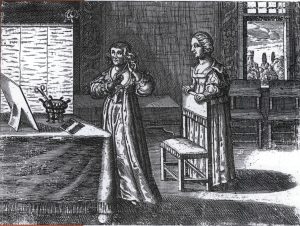
In a rhetorical apostrophe – “And in female persons who […]” – she impresses upon the Danish women that there is no better use for their time than to spend it on this work, which will bring them closer to “virtue”. Virtue comes from the ethical virtus, by which the Romans designated the moral good deed, not merely in the narrow sexual sense, but in the broadest possible ethical meaning. Birgitte Thott then reaches an oft-quoted passage the sentiments of which echo feelings expressed by women in the debate taking place abroad; by, for example, Anna Maria van Schurman: “You should not refrain from reading that which contains wisdom because you are of the female sex for whom learning is considered futile, if not even directly harmful. If wisdom is considered dangerous for some people more than for others, then I wonder if it can be proven that ignorance is beneficial? Were we, as supposed, so frail that we should not be able sufficiently to tolerate reason, then we would even less be able to control ourselves with lack of reason.”
An Aristotelian syllogism in periphrastic form, but absolutely logical.
She refers to the ancient Greek writer Plutarch, whom she credits with the view that the woman who studies would be ashamed to pass her time indulging in pleasure or superstition.
Her translation of Seneca was the one project above all others that ensured Birgitte Thott’s fame. She prepared it in Sorø, at the Thurebygaard estate where she enjoyed the life of landed proprietoress in a Scandinavian variant of the French salon, surrounded by learned men and most likely women too. This ‘salon’ would have had a Nordic ambiance of Lutheran piety and theological debate.
Even though the serious topics undoubtedly curbed the merriment when compared with the impression we have of the French literary and art salons, Birgitte Thott would certainly have been extremely contented in her scholarly environment. The privilege of being liberated from women’s conventional chains and being informed on an equal footing with men about the latest developments in science, politics and the arts must have been at least as good as sophisticated French laughter among refined poets. We can trace her friendships with the families Bartholine, Giøe, Brahe, Rosenkrantz, and Thott, and with individuals in the cultural life of Sorø, such as Henrik Ernst, Johannes Lauremberg, Johannes Faber, Erik Pontoppidan, Rasmus Brochman and others. An invitation to a wedding at the King’s Castle in Copenhagen, addressed to widow Mrs Thott, has also been preserved. She did not suffer from boredom.
On a Happy Life
However great and well-deserved the fame accorded Birgitte Thott by virtue of her translation of Seneca, there is perhaps even more reason to take an interest in a large, unpublished work which must be credited to her hand: the aforementioned Om et lyksaligt liv (On a Happy Life). It is practically unknown, and remains unpublished.
According to Karen Brahe, Om et lyksaligt liv was “compiled and written by Mrs Birgitte Thott […] while transcribed by her brother’s daughter Miss Sophia Thott”, which must mean that the text is by Birgitte Thott, but the copy concerned was made by one Sophie Thott, possibly the daughter of Birgitte’s brother.
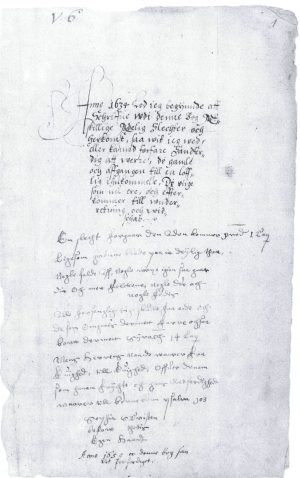
Preface references to a number of terrible events that befell the Danish nation would suggest the wars with Sweden, and thus date the work to around 1658 – the same year as the publication of her translation of Seneca. The two works also have extended and nearly identical passages in common, indicating that Birgitte Thott worked simultaneously on the two texts, possibly first on Seneca and then on her own treatise.
It gives pause for thought that Birgitte Thott wrote this magnum opus, with its highly optimistic title, in the middle of Denmark’s war with Sweden, a war which in the late 1650s was raging in mid-Zealand, the very area of Denmark where she lived. Her own manor house was laid waste. We do not know the exact nature of the damage, but she never returned to live at Thurebygaard and had to rely on the kindness of others until her death in 1662. Sorø Academy opened its doors to her, providing her with a home, a place to work with a good library, a scholarly environment and young academic admirers. She bequeathed her own library to the Academy, and it is likely that – had the Academy not also been destroyed, by fire in 1813 – we would here have found the manuscripts, notes, translations and letters in Latin about which we hear from her contemporaries and of which today we have but meagre remnants.
The original manuscript of Om et lyksaligt liv, written around 1658, has been lost. The work exists, however, in no less than two complete copies, both kept in Karen Brahe’s Library.
Om et lyksaligt liv is a moral-philosophical work, structurally modelled on the moral treatises of antiquity, which were particularly well-known in Birgitte Thott’s day from the works of Cicero and Seneca. The Christian moral philosopher Boethius, active in late antiquity, was a major influence through his work De Consolatione philosophiae (Consolation of Philosophy). In an amalgamation of Christian and Stoic pagan ideas, Birgitte Thott refers alternately to the mortal and the celestial representatives of these two authorities. Beneath the harmony, the author displays a faint glimpse of protest about the way in which the Danish clergy administrate Christianity. The heavy-handed treatment to which the congregations had been subjected under the many years of strict orthodoxy could not always be reconciled with Stoic ideas, according to which the highest authority for the individual should be personal conscience, irrespective of laws, practices and officialdom. Each individual Stoic must construe his or her own deity. He or she is involved in a constant search for clarification and wisdom, and the results of this searching are put to use in conscientious action. There is no intermediary corresponding to the Christian clergyman, and there is no requirement of humility. Birgitte Thott, like many other Christians, found Stoic philosophy, the practical ethics of which were as close as any to the Christian dogma of charity, an inspiration and a provocation. Being a good Christian, she never cast off her humility in the face of God, but she was undoubtedly attracted by the freedom to make an independent interpretation of teachings, as allowed by Stoicism. She was also drawn to other philosophers of antiquity such as Plato, Aristotle and Plutarch. She could not, however, really be described as rebellious. She speaks, basically, in the name of God.
Now and then, Birgitte Thott might seem more like a Stoic philosopher than a Christian Dane. But if it came to a real confrontation between pagans and Christians, she clearly sided with the Christians, as in, for example, the question of suicide. On this issue she came into conflict with the Stoics, who believed suicide to be permissible in a wide range of circumstances – too wide a range for a Christian to accept.
Om et lyksaligt liv is divided into fifty chapters. A short introduction is followed, in chapters 2 to 9, by discussion of seemingly good things, indifferentia and adiaphora. In chapters 10 and 11, the author addresses the actual good things: the true happiness. In chapters 12 and 13, virtue is described and classified. She then goes through the virtues one by one. From chapter 14 up to 42, the vices are brought in at random with the virtues. Towards the end, the Stoic sage and the Christian God come together; God is the victor: piety is the foundation, as we can read in chapter 43.
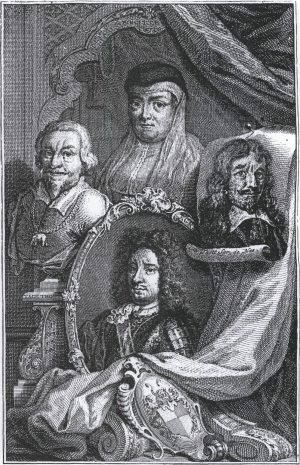
This grandiose conclusion includes two chapters that quite clearly indicate Birgitte Thott’s personal opinion, perhaps because she feels a little on the defensive. Chapter 45 addresses the issue of studies and the beneficial effect of scholarship on the potential for happiness: “On the Benefit Found in Study.” The conclusion, as could be expected, is that study has a favourable impact. Studying provides the means by which to sort the seemingly good from the truly good. Birgitte Thott elegantly sets the scene for the much-quoted chapter 46, which she had long had up her sleeve, with its heading: “That study, if used correctly, is by no means harmful, but on the contrary beneficial to women.” The theme is recognisable from the preface to women in her Seneca translation. The topic was still far from exhausted; nor, judging from Birgitte Thott’s apology for bringing it up at all, was it uncontroversial in Denmark:
“Even though I know that I have taken on a task too heavy for my shoulders, especially as I am aware that I procure both many and mighty adversaries, I can nevertheless not desist in promoting the cause of our sex – the sex which an old ingrained practice or view, as Seneca says, endeavours to preclude completely and utterly from all the benefits of wisdom.”
The chapter opens with a repetition of the conclusion from the previous chapter: all rational people must concede that study is an important means by which to achieve wisdom and prudence. Straight away, however, “another question emerges: if it is becoming for all people or for only a section of them to venture the attainment of wisdom through study.” It is generally agreed, she thinks, that this venture is befitting for all persons of rank. It is however strange, she states, that no matter how profitable it might be thought, most would nonetheless exclude “half of humankind, this being the whole of womankind, from the opportunity to learn foreign languages and be instructed in any form of knowledge and subject areas and acquire a taste for and of the learned men’s written works.” She immediately gives her verdict on this attitude: “By this, I think, women are done the greatest injustice.” In a long metaphor, Birgitte Thott now points out that wisdom is the only experienced helmsman who can guide our ship of life through the stormy seas without us running aground or being shipwrecked. Only with this helmsman can we safely go onboard and take on the misfortunes and difficulties by which we will be beset on the voyage.
Before embarking on a methodical refutation of the arguments advanced to make women desist from study, she states some very specific provisos. These might well remind us of those laid down by Anna Maria van Schurman in the Netherlands. Birgitte Thott, however, tightens them up even more, unfortunately not in women’s favour.
“But before I examine the issue in greater depth, I would solemnly declare, which I do hereby, that I readily renounce and accord men all that right and dignity and authority they, according to the laws of God and of humankind, rightly claim. To them I readily yield and entrust to them in all matters the honourable distinction, and thus advise women, regardless of the rank and the conditions from which they come, to be guided in all matters by the will of the people who rightly have authority over them, […] on condition, however, that the men do not completely refuse us access to all knowledge or impose on women the penalty that they [the women] must yield to them; and the men must exhibit the lenience towards them that they [the women] with their consent might relieve the weakness of nature by means of art, and with learning and advantageous teaching be helped so much that they, too, to some extent might be transformed according to virtue.”
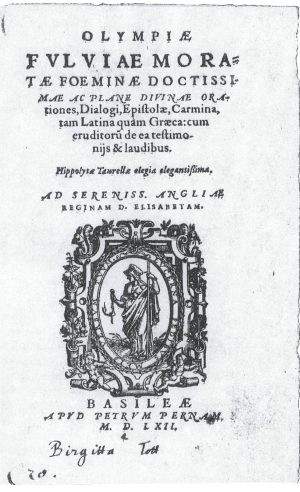
Birgitte Thott is willing to subject herself and her gender to anything, if only women be not denied access to books! She spends thirteen closely-written manuscript pages on her arguments against the stock contentions that it is not in men’s interest, or that it is directly harmful to women, for women to acquire knowledge. Language skills are defended with the argument that the foreign language per se is not dangerous, but the sentiments expressed in it might be so. The more one knows, however, the better able one is to differentiate between bad and good; as good is what will be, in the long run, of personal benefit, then learning will aid the ability to avoid vices such as idleness, immorality, greed and the like. She again seeks support from the writers of antiquity. And it is yet again Seneca and Plutarch who have won her heart, while Plato is deployed strategically because he is generally considered to be an authority. She is also familiar with Diogenes Laërtius’ enormous biographical work, which is a major source of information about classical philosophy, and she knows that this work was dedicated to his learned daughter who, according to Birgitte Thott, was bequeathed his book collection. She refers to the gynaeceum writer Johannes Bergamensis, from the cultural circles of the northern Italian Renaissance, and to a number of others. In reference to Seneca, she indirectly quotes a lengthy passage from his treatise Consolatio ad Helviam matrem (To Helvia, On Consolation), a consolatory text to his mother, Helvia, when she was widowed and he was in exile. Seneca advised his mother to resume the studies of her youth in order to remedy her grief. He regrets that his father did not allow her to become steeped in learning but says that it is never too late. Later, in chapter 46, this view can be heard echoed in Birgitte Thott’s voice when she exclaims: “Even were I to be standing with one foot in the grave, I would still be studying.”
Seneca’s Helvia section is reproduced almost word-for-word. She begins the citation by letting Seneca side with women: “Seneca – who is as dear to me as 1000 – has, I think, taken our side.” I have already quoted him many times, she says, but does so once more anyway. Helvia should not, as others have obviously suggested to her, mitigate her grief and drive away her longing “by pleasures and preoccupations […] or spend a lot of time carefully going through your accounts and administering your estate, or constantly be involved in some new activity. All those things help only for a short time […].” He reminds her that she had some early acquaintance with study, and he advises her: “Return now to these studies and they will keep you safe. They will comfort you, they will delight you; and if they genuinely penetrate your mind, never again will grief enter there, or anxiety, or the distress caused by futile and pointless suffering.” And should anyone question Seneca’s authority, Birgitte Thott has her response ready: “I, in truth, had I no more than his advice to guide me […] would confine myself to the company of the Muses.”
Thott got away with her defence of women because she understood how to keep the balance between what was generally accepted and what was confrontational. It was a stroke of genius to insert the preface to women in her translation of Seneca, which was published. We do not know why Om et lyksaligt liv was not published. There could be many explanations, one being that her chapter 46 did not have a sufficiently inspiring impact on the male censors who had to grant their imprimatur before a book could be sent to print. The work as we have it today exists in two copies; one is known with certainty to have been made by a woman, both were kept by another woman in a convent.
Translated by Gaye Kynoch

